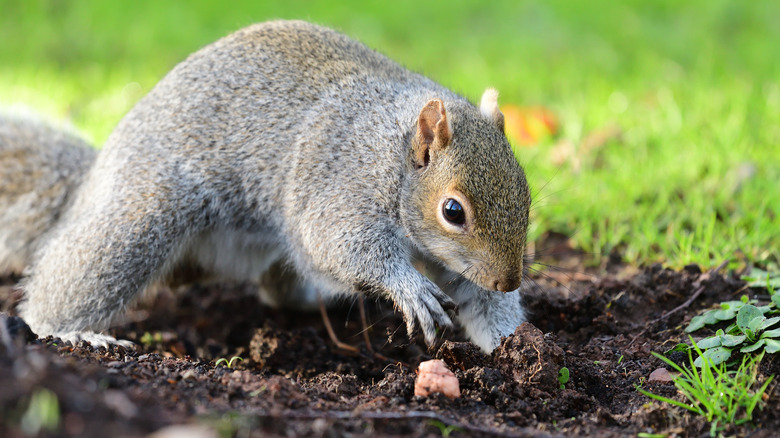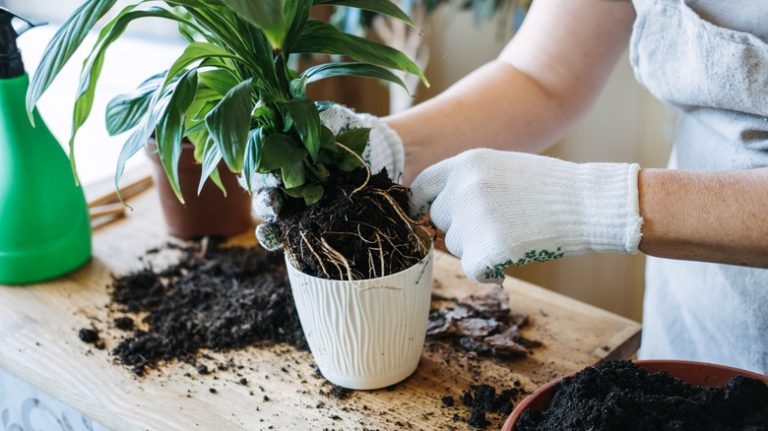Squirrels can be a thorn in any gardener’s side at the best of times, and it often seems no bulb is safe from these tenacious scavengers. However, these cheeky little fellas can be particularly problematic during the fall when their food sources are running scarce, and they hunt for food to hoard for the winter. There’s nothing quite like spending an afternoon planting some carefully selected bulbs, only to find the moment your back is turned, these big-toothed and bushy-tailed pirates have undone all your hard work.
Alongside nuts, grains, seeds, fruit, fungi, vegetables, and roots, squirrels love a juicy and freshly laid bulb, particularly tulips or crocus, because they love the scent and taste. All critters have got to eat, and where you see a flower waiting to bloom, they see a quick and convenient protein-rich meal. However, you don’t have to grab a gun and go all Elmer Fudd to deal with your squirrel problem. There are some tried, tested, and humane methods to deal with these herbivore rascals. From actively denying the squirrels access to outwitting them with some hidden surprises, here’s how to give your bulbs a fighting chance this fall.
Plant a sharp surprise alongside the bulbs
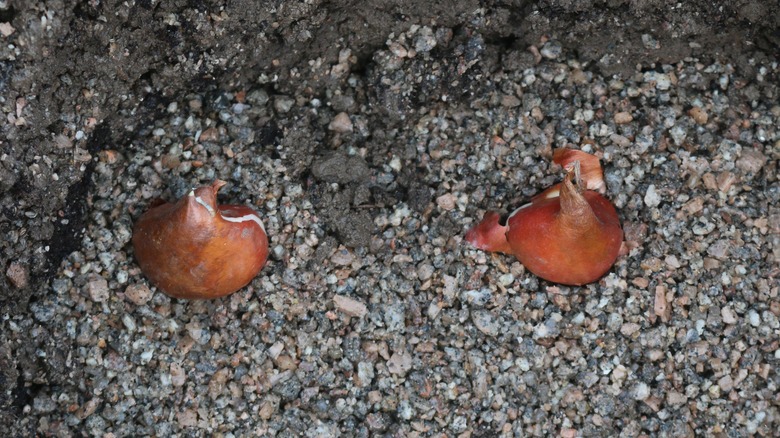
Alongside leaping from tree to tree like daredevil acrobats and hoarding nuts like obsessive misers, squirrels love to dig in search of food, such as bulbs! However, you can deter even the most determined little digger by scattering a little sharp gravel on your flower beds. If you prefer something more elaborate, you could add a little crushed oyster shell to put an end to the rodent’s fun and games.
Covering your bulbs with something sharp and jagged is a great way to place a protective barrier between the squirrel and their heart’s desire. When digging becomes too much of an effort, squirrels will simply take the easy option and move on to new pastures. Squirrels are no fans of the rough and unforgiving texture of oyster shells. And gravel, which can be purchased by the bag in most garden stores, is not a material they want to cut their claws on.
Protect your bulbs with chicken wire
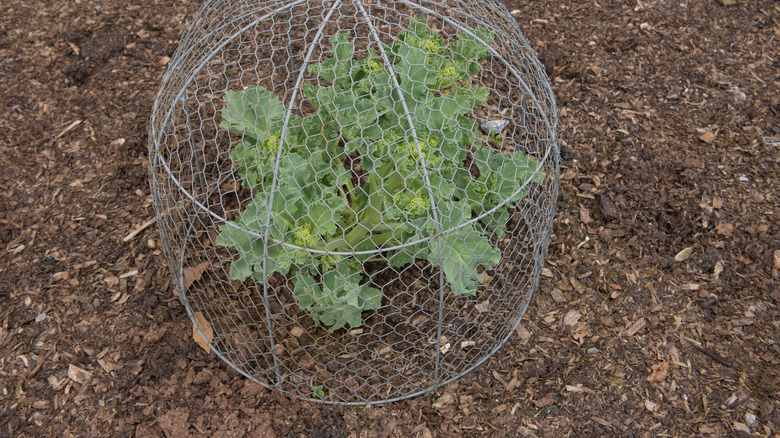
If you want to keep something at bay, a simple approach is usually the best. Chicken wire may be designed to keep poultry in, but it also works wonders at keeping squirrels out. It’s cheap, effective, and easy to use. After putting the bulbs in the ground, cover the surface area with wire and stabilize it by hammering some stakes into the corners or using some heavy stones to hold it in place. Chicken wire is a versatile material, but it can be an eyesore. However, you can remedy this problem by hiding it with a covering of bark or mulch.
Safe and secure behind a mesh covering, the bulbs can safely grow through the holes in the chicken wire. The beauty of chicken wire is it’s a very versatile material. You can install it both above and below the ground to stop burrowing critters such as moles and voles in their tracks. You can also use it to make a cloche or a garden cage. Either way, a squirrel will not waste time digging for your bulbs if a layer of wire mesh is in the way. As gardener and allotment guru Dr. Chris Wood told Yahoo, “Squirrels hate the feeling of metal on their teeth.”
Try mixing a little bit of chili powder in with the bulbs
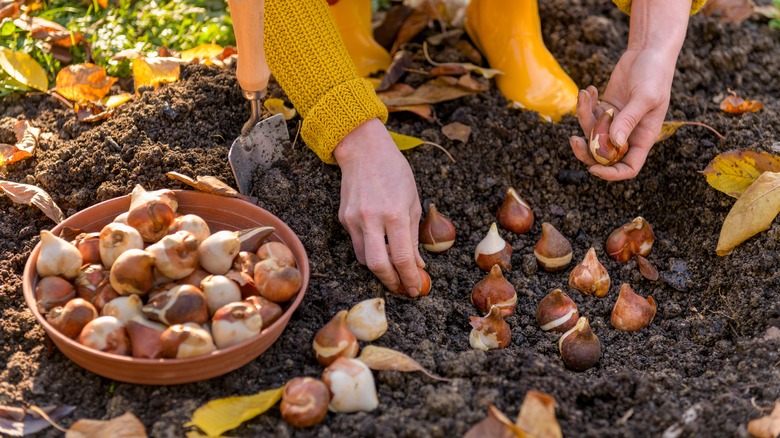
Abo Photography/Shutterstock
Chili powder may help boost circulation, lower cholesterol, enhance digestion, and give your tastebuds a workout to remember, but squirrels cannot abide the spicy stuff. It’s a perfect deterrent to stop the ravenous rodents from ravishing your bulbs. Lloyd Scott, RSPB wildlife adviser, told The Daily Mail, “Using chili powder to deter squirrels is a cheap, easy, and effective solution.” And head gardener at Forde Abbey, Alice Kennard, shared with Gardens Illustrated, “Before we plant an area, all the tulips that are going into it are thrown into a trailer. Copious amounts of extra hot Indian chili powder is put onto them, and it is thoroughly mixed into the bulbs, and then they are planted.”
However, simply scattering chili powder on the ground’s surface after planting the bulbs will work just as well. Chili works so well at keeping squirrels at arm’s length because spicy smells disturb their equilibrium. They will go out of their way to avoid areas that smell like a busy restaurant kitchen and will pass your bulbs on by. If you opt to use this hack, remember to reapply the chili powder after each heavy rainfall.
Go deeper with your planting
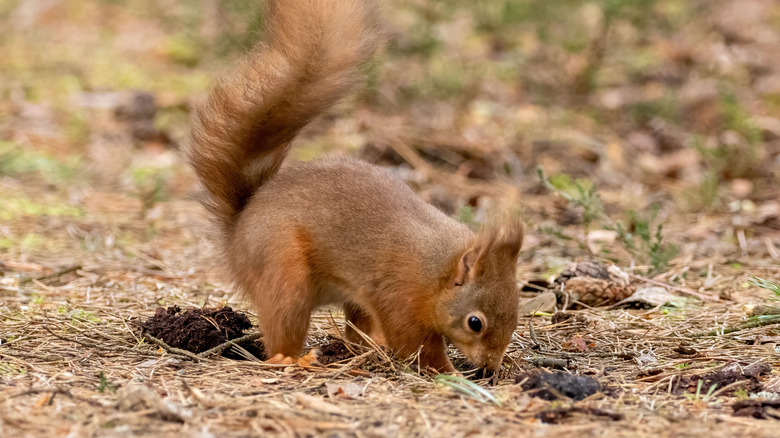
Wirestock/Getty Images
As all good pirates know, the deeper you plant your treasure, the harder it is for any opportunistic bounty hunters to find it, and the same principle rings true for your bulbs and squirrels. A lot of gardeners make the mistake of placing their bulbs too close to the surface. However, if you are willing to go a little deeper, it will dissuade all but the most determined squirrel. Gardening expert Sam Marlow explained to Yahoo, “Make sure to plant the bulbs at an appropriate depth, of around six to eight inches, as this will help stop squirrels from digging for them.”
The majority of squirrels will only burrow down a couple of inches in search of bulbs before calling it a day. As well as planting your bulbs out of sight and out of mind, it’s also a good idea to capitalize on a squirrel’s general laziness when it comes to digging. Garden and allotment expert Dr. Chris Wood told Yahoo, “Try disguising the area where you’ve planted bulbs with leaves or wood chippings, so the freshly dug soil is less visible.”
Ditch the natural fertilizers
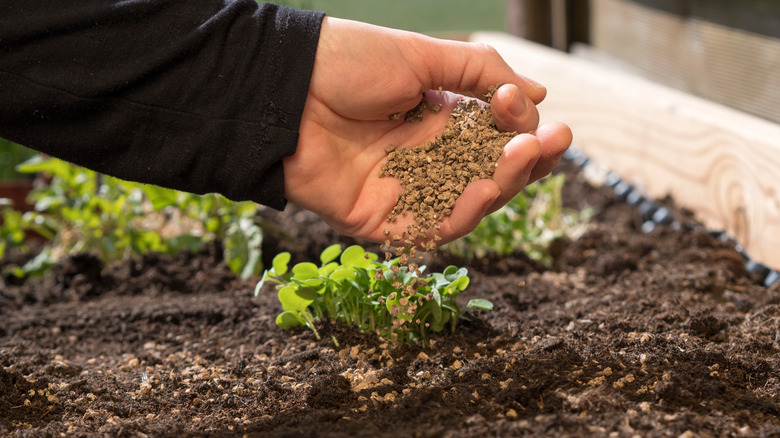
Floki/Shutterstock
Natural fertilizers may have a lot of benefits for the soil ecosystem and the environment, but they might just be the reason why the squirrels won’t leave your bulbs alone. The odors present in a fertilizer made from blood meal, bone meal, or fish emulsion are an open invite to your garden for a wandering squirrel. As a consequence, they’ll come for the fertilizer and stay for the bulbs. Particularly if you are using smelly fertilizer on and near your bulbs.
Using natural fertilizers may help your bulbs grow, but if their smell attracts a horde of bushy-tailed diners, they won’t survive until spring, and their flowers will die in the ground. It’s wise to use odor-free synthetic fertilizers to remove all temptation for squirrels. If they don’t smell a reason to visit your yard, there’s a good chance squirrels will leave your bulbs well alone.
Feed the squirrels, spare the bulbs
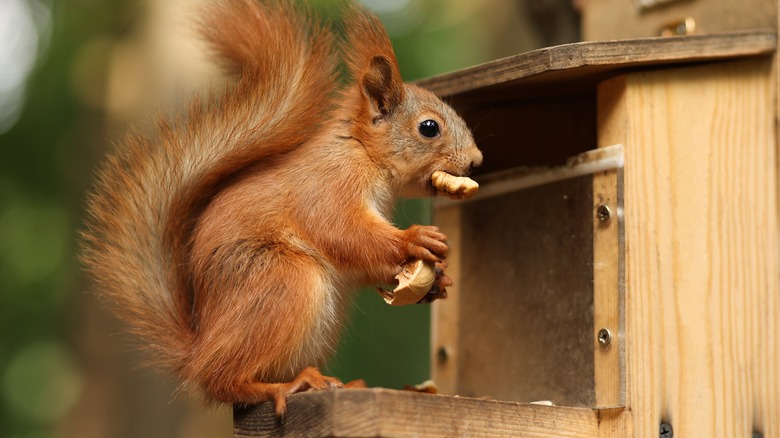
happiness69/Shutterstock
Like everything that flies, walks, crawls, hops, or slithers under the sun, squirrels need to eat. It’s why they dig up your bulbs. Not to be naughty but because nature dictates it. That’s why some gardeners recommend actively feeding the inquisitive little critters so they spare your bulbs. It’s a controversial theory because many believe offering ready-made nibbles in a squirrel feeder encourages them to view your yard as their private diner. However, feeding the squirrels works particularly well during the fall because they are looking for anything to help them survive the winter.
Eric Michels from CJ Wildlife told Yahoo, “One of the best ways to deter them from pilfering your spring bulbs is to provide a plentiful supply of alternative food so that they aren’t tempted to go digging in your beds and borders. If they have their own food in an easily accessible squirrel feeder, they are much less likely to steal from elsewhere in your garden.” Squirrels like to put their feet up when they feast, so it’s recommended you purchase a feeder with a perch. Fill it with some nutritional feed, available in most garden stores, and ensure it has a lid for easy access. You can have some great fun watching the little fellas figure out how it works as your bulbs stay safe in the ground.
Opt for bulbs that aren’t on the squirrel’s menu
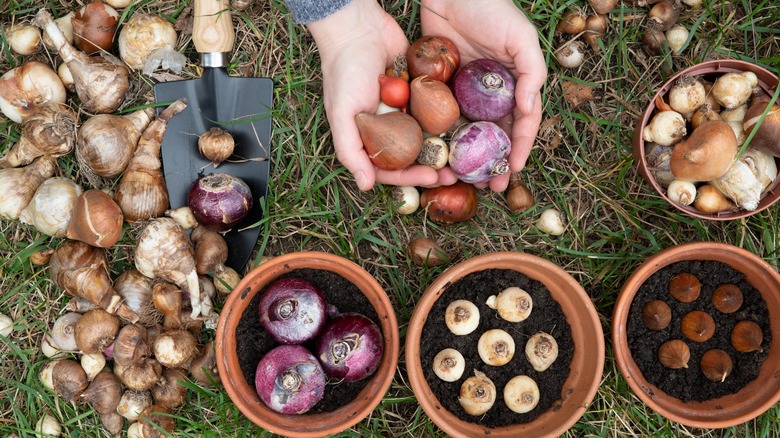
photka/Shutterstock
In terms of what bulbs squirrels find the most desirable, tulips and crocuses top the menu by a country mile. Which is bad news for big fans of these two flowers. However, just as they love certain bulbs, they cannot abide others. The scent of daffodils and alliums acts as a strong deterrent, and they avoid hyacinths and snowdrops like the plague because they are poisonous to them. To keep all your bulbs safe, plant a few of the less desirable ones in the vicinity of the ones that make their mouth water and eyes bulge with desire.
By masking the scent of the tulips and crocuses with something a lot less favorable, the squirrel’s appetite should fade faster than a vegan’s in a butcher shop. You can also use a companion planting system to protect your bulbs. Alongside other critters, squirrels are not fond of the scents that onions, leeks, garlic, mint, or marigolds give off. So, what’s good for your bulbs could also be good for your kitchen!

